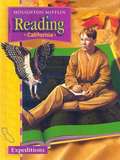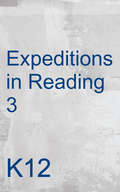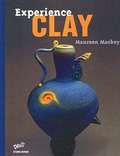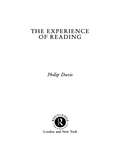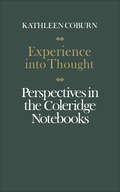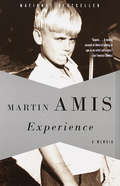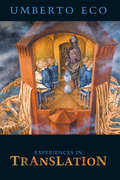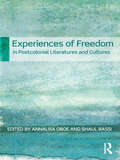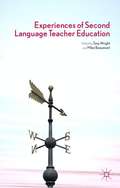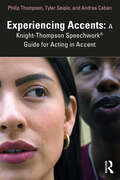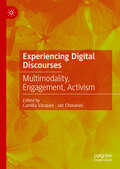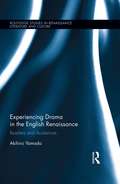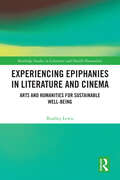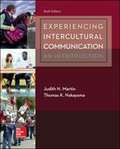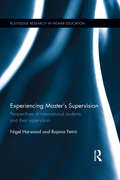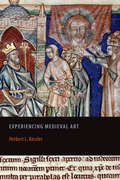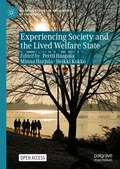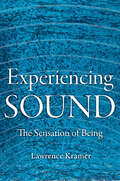- Table View
- List View
Expeditions
by Shane Templeton J. David Cooper John J. Pikulski Gilbert Garcia Claude Goldenberg Phyllis Hunter Marjorie Y. Lipson Sheila Valencia Maryellen Vogt Kathryn Au David J. ChaNIMAC-sourced textbook
Expeditions (California)
by J. David Cooper John J. Pikulski Patricia A. AckermanNIMAC-sourced textbook
Expeditions 5th Grade (California)
by J. David Cooper John J. Pikulski Kathryn AuLiterature textbook
Experience Clay
by Maureen MackeyLEVEL: 6th form onwards. This contemporary guide to clay techniques, tools, and traditions is as inspirational as it is practical. Supported by a clear, step-by-step illustrations, this comprehensive resource details a range of hand building and wheel throwing techniques. From the properties of clay to decoration and firing, all information presented is shown against a rich backdrop of dynamic professional and student work. While encouraging students of varying abilities to explore their own unique style and interests, basic to advanced studio opportunities highlight teaching tips and safety notes at point of use. Friendly and definitive, this stimulating guide to clay is ideal as an introductory text for a studio course from Art I to Ceramics IV. The student text explores ancient traditions and historic innovations. It also includes carefully crafted lessons organised for success in creating art and mastering key concepts and skills while introducing students to: Contemporary masters; Cutting-edge works of art; New media; Techniques and safety precautions; Current careers in art.
Experience Clay
by Maureen MackeyLEVEL: 6th form onwards. This contemporary guide to clay techniques, tools, and traditions is as inspirational as it is practical. Supported by a clear, step-by-step illustrations, this comprehensive resource details a range of hand building and wheel throwing techniques. From the properties of clay to decoration and firing, all information presented is shown against a rich backdrop of dynamic professional and student work. While encouraging students of varying abilities to explore their own unique style and interests, basic to advanced studio opportunities highlight teaching tips and safety notes at point of use. Friendly and definitive, this stimulating guide to clay is ideal as an introductory text for a studio course from Art I to Ceramics IV. The student text explores ancient traditions and historic innovations. It also includes carefully crafted lessons organised for success in creating art and mastering key concepts and skills while introducing students to: Contemporary masters; Cutting-edge works of art; New media; Techniques and safety precautions; Current careers in art.
Experience Of Reading
by Philip DavisFirst published in 1991. Routledge is an imprint of Taylor & Francis, an informa company.
Experience and Teleology in Ancient Historiography
by Jonas GrethleinThe past is narrated in retrospect. Historians can either capitalize on the benefit of hindsight and give their narratives a strongly teleological design or they may try to render the past as it was experienced by historical agents and contemporaries. This book explores the fundamental tension between experience and teleology in major works of Greek and Roman historiography, biography and autobiography. The combination of theoretical reflections with close readings yields a new, often surprising assessment of the history of ancient historiography as well as a deeper understanding of such authors as Thucydides, Tacitus and Augustine. While much recent work has focused on how ancient historians use emplotment to generate historical meaning, Experience and Teleology in Ancient Historiography offers a new approach to narrative form as a mode of coming to grips with time.
Experience into Thought: Perspectives in the Coleridge Notebooks
by Kathleen CoburnColeridge is admired as a genius and derided as an opium addict and plagiarist. The aim here has been to examine his experiences, moods, thoughts, and reactions as a whole and their relation to poems such as Christabel, the Ancient Mariner, and the Dejection ode, and to his prose works, and also to look at many of his own statements made mainly in the privacy of his notebooks about his aims and purposes. The result of the new compound should alter some of the uninformed and prejudiced generalizations about Coleridge. The new picture is of a man and poet more human, more inquiring, more sceptical, whose strength and intellectual stature can fully be understood only against a background of suffering and loneliness; a critical, radical imagination is seen not only struggling to survive but to achieve creatively in the process.One of the world's pre-eminent Coleridge scholars, Kathleen Coburn brings a long association with and intimate knowledge of Coleridge's writings, both published and unpublished, to this sensitive study of a complex mind and personality.
Experience: A Memoir (Vintage International)
by Martin AmisNATIONAL BESTSELLER • One of the most gifted and innovative writers of our time discloses a private life every bit as unique and fascinating as his bestselling novels.&“Superb memoir...a moving account of [Amis&’s] coming of age as an artist and a man.&” —San Francisco Chronicle The son of the great comic novelist Kingsley Amis, Martin Amis explores his relationship with this father and writes about the various crises of Kingsley's life. He also examines the life and legacy of his cousin, Lucy Partington, who was abducted and murdered by one of Britain&’s most notorious serial killers. Experience also deconstructs the changing literary scene, including Amis' portraits of Saul Bellow, Salman Rushdie, Allan Bloom, Philip Larkin, and Robert Graves, among others. Not since Nabokov's Speak, Memory has such an implausible life been recorded by such an inimitable talent. Profound, witty, and ruthlessly honest, Experience is a literary event.
Experiences in Translation
by Umberto Eco Alastair McewenIn this book Umberto Eco argues that translation is not about comparing two languages, but about the interpretation of a text in two different languages, thus involving a shift between cultures. An author whose works have appeared in many languages, Eco is also the translator of Gérard de Nerval's Sylvie and Raymond Queneau's Exercices de style from French into Italian. In Experiences in Translation he draws on his substantial practical experience to identify and discuss some central problems of translation. As he convincingly demonstrates, a translation can express an evident deep sense of a text even when violating both lexical and referential faithfulness. Depicting translation as a semiotic task, he uses a wide range of source materials as illustration: the translations of his own and other novels, translations of the dialogue of American films into Italian, and various versions of the Bible. In the second part of his study he deals with translation theories proposed by Jakobson, Steiner, Peirce, and others.Overall, Eco identifies the different types of interpretive acts that count as translation. An enticing new typology emerges, based on his insistence on a common-sense approach and the necessity of taking a critical stance.
Experiences of Freedom in Postcolonial Literatures and Cultures
by Shaul Bassi Annalisa OboeModern ideas of freedom and human rights have been repeatedly contested and are hotly debated at the beginning of the third millennium in response to new theories, needs, and challenges in contemporary life. This volume offers culturally diverse contributions to the debate on freedom from the literatures and arts of the postcolonial world, exploring experiences that evoke, desire, imagine, and perform freedom across five continents and two centuries of history. Experiences of Freedom opens with an introductory philosophical essay by Achille Mbembe and is divided into four sections that consider: • resisting history and colonialism • the right to move and to belong • the right to (believe in) free futures • imaginative freedom and critical engagement. Each section contains a piece of creative writing directly connected to these topics from authors Chris Abani, Anita Desai, Caryl Phillips, and Alexis Wright, followed by a selection of critical essays. Contributors: Chris Abani, Rochelle Almeida, Gil Anidjar, Jogamaya Bayer, Elena Bernardini, Anne Collett, Carmen Concilio, Paola Della Valle, Roberto Derobertis, Anita Desai, Lorna Down, Francesca Giommi, Gareth Griffiths, Dave Gunning, John C. Hawley, Peter H. Marsden, Russell McDougall, Achille Mbembe, Cinzia Mozzato, Kevin Newmark, Berndt Ostendorf, Mai Palmberg, Owen Percy, Kirsten Holst Petersen, Caryl Phillips, Annel Pieterse, Christiane Schlote, Nermeen Shaikh, Patrick Williams, Alexis Wright, and Robert J. C. Young.
Experiences of Second Language Teacher Education
by Tony Wright Mike BeaumontThis book brings together the voices of teacher educators working in different national and educational settings. It Covers themes such as change in teacher education practices, the influences of context on practice, and of interculturality, to provide rich insights into the processes and effects of second language teacher education.
Experiencing Accents: A Knight-Thompson Speechwork® Guide for Acting in Accent
by Andrea Caban Philip Thompson Tyler SeipleExperiencing Accents: A Knight-Thompson Speechwork® Guide for Acting in Accent presents a comprehensive and systematic approach to accent acquisition for actors. It lays out an accessible and effective set of tools, exercises, and theoretical frameworks grounded in current linguistic science, as well as more than two decades of teaching, actor training, and coaching developed by Knight-Thompson Speechwork®. This book dismantles the notions that accents exist on a spectrum of good and bad or that "neutral," "general," or "standard" can serve as ideals for speech. By de-centering elitist and authoritarian worldviews, it gives actors a path to mobilize their innate language abilities to acquire any accent, relying on descriptive and experiential knowledge. The innovative approach of the Four Ps – People, Prosody, Posture, and Pronunciation – builds cultural competence that honors accents as they exist in the world, increases the physical and perceptive skills of the actor, and provides a rich variety of applications to encourage fluid and embodied accent performance. Each of the Four Ps are investigated and practiced separately and then synthesized in the art of the performer, allowing actors to address the complexity of acting in accent through a deliberate and sequential layering of skills, rendering the final expression of their technique meticulously accurate and deeply authentic. Organized into fifteen modules to correspond with a typical semester, Experiencing Accents is perfect for Theatre students in voice, speech, and accents courses, along with working actors interested in improving their accent work.
Experiencing Digital Discourses: Multimodality, Engagement, Activism
by Camilla Vásquez Jan ChovanecThis edited book addresses current trends in digital discourse analysis. The central theme of the volume is the notion of ‘digital experiences’; in other words, how users rely on mediating technologies both to communicate and bond with others, and to organize themselves for joint action. The chapters are grouped into three overarching themes: user engagement, multimodal communication, and online activism. Topics covered include memetic and multimodal humor on the internet, sticker use on WeChat, language ideology debates on YouTube, covert communication in QAnon forums, COVID narratives on Korean vlogs, and political activism on Twitter, among others. The book will be of interest to scholars in the broadly defined field of digital discourse analysis. It will be relevant to linguists, social media researchers, communication scholars, and media and cultural studies specialists.
Experiencing Drama in the English Renaissance: Readers and Audiences (Routledge Studies in Renaissance Literature and Culture)
by Akihiro YamadaThis book investigates the complex interactions, through experiencing drama, of readers and audiences in the English Renaissance. Around 1500 an absolute majority of population was illiterate. Henry VIII’s religious reformation changed this cultural structure of society. ‘The Act for the Advancement of True Religion’ of 1543, which prohibited the people belonging to the lower classes of society as well as women from reading the Bible, rather suggests that there already existed a number of these folks actively engaged in reading. The Act did not ban the works of Chaucer and Gower and stories of men’s lives – good reading for them. The successive sovereigns’ educational policies also contributed to rising literacy. This trend was speeded up by London’s growing population which invited the rise of commercial playhouses since 1567. Every citizen saw on average about seven performances every year: that is, about three per cent of London’s population saw a performance a day. From 1586 onwards merchants’ appearance in best-seller literature began to increase while stage representation of reading/writing scenes also increased and stimulated audiences towards reading. This was spurred by standardisation of the printing format of playbooks in the early 1580s and play-minded readers went to playbooks, eventually to create a class of playbook readers. Late in the 1590s, at last, playbooks matched with prose writings in ratio to all publications. Parts I and II of this book discuss these topics in numerical terms as much as possible and Part III discusses some monumental characteristics of contemporary readers of Chapman, Ford, Marston and Shakespeare.
Experiencing Epiphanies in Literature and Cinema: Arts and Humanities for Sustainable Well-being (Routledge Studies in Literature and Health Humanities)
by Bradley LewisExperiencing Epiphanies in Literature and Cinema uses health humanities and psychological humanities to explore literary and cinematic epiphanies. James Joyce first adopted the term “epiphany” from its religious use to articulate momentsof luminous intensity or “sudden spiritual manifestation.” This study develops and extends Joyce’s use of epiphany through a range of literary and cinematic examples, from William Shakespeare to Ruth Ozeki and from Yasujirō Ozu to Jim Jarmusch. This wealth of epiphanies in the arts is important from a health humanities perspective in that they provide access to aesthetic and sustainable experiences of well-being, joy, and human flowering. They also provide antidotes to aesthetics of anti-epiphany—a showing forth of terror, horror, and panic. Experiencing Epiphanies is accordingly both critical and affirmative, diagnostic and therapeutic. It uses critique to understand the increasing need for well-being in contemporary times, and it uses affirmation to develop underutilized resources in the arts for transforming, configuring, and refiguring our everyday lives.
Experiencing Intercultural Communication: An Introduction
by Judith Martin Thomas NakayamaThe sixth edition of Experiencing Intercultural Communication, An Introduction provides students with a framework in which they can begin building their intercultural communication skills. By understanding the complexities of intercultural communication, students will grow in their professional endeavors and personal relationships. The unique backgrounds of coauthors Judith N. Martin, a social scientist, and Thomas K. Nakayama, a critical rhetorician, bring a distinctive perspective to this thought-provoking subject matter. The Connect course for this offering includes SmartBook, an adaptive reading and study experience which guides students to master, recall, and apply key concepts while providing automatically-graded assessments.
Experiencing Master's Supervision: Perspectives of international students and their supervisors (Routledge Research in Higher Education)
by Nigel Harwood Bojana PetrićMaster’s degree programmes are on the rise, attracting growing numbers of international students who speak English as a second or additional language. Experiencing Master’s Supervision: Perspectives of International Students and their Supervisors explores the experiences of supervising and being supervised at Master’s level, charting the difficulties and joys of learning for second language speakers of English while based at a UK university. The authors report the findings of a year of studying both supervisees and their supervisors in four different departments in the social sciences and humanities at a UK research-intensive university. Using a multiple case study approach, and examining supervision in its natural context, this book presents rich descriptions of five case studies: three student-supervisor dyads and two cases of individual students. Analysing rich, first-hand narratives, chapters identify key aspects of satisfaction and dissatisfaction through the eyes of the participants, focusing upon expectations, supervision styles, feedback and students’ support networks, and discussing the broader implications for university and departmental policy makers, responsible for guidelines and requirements. This book contains important insights into the supervisory experience at Master’s level and will appeal to researchers, academics and postgraduate students in the fields of higher education, TESOL, TEFL/TESL and applied linguistics. This book will also be a useful resource for supervisors, leaders of training sessions for supervisors, and for postgraduate directors and teaching committees at universities who develop supervisory guidelines and preparatory sessions for Master’s students.
Experiencing Medieval Art (Rethinking the Middle Ages)
by Herbert L. KesslerExperiencing Medieval Art is an extensive revision and expansion of the author’s Seeing Medieval Art, originally published in 2004. Renowned art historian Herbert L. Kessler considers often-strange objects and the materials of which they are made, circumstances of production, the conflictual relationship between art objects and notions of an ineffable deity, the context surrounding medieval art, the playfulness of art and the formal movements it engaged, as well as questions of apprehension, aesthetics, and modern presentation. Kessler introduces the exciting discoveries and revelations that have revolutionized the understanding of medieval art and identifies the vexing challenges that still remain. Examining such well-known monuments as the stained glass in Chartres cathedral, mosaics in San Marco Venice, and Utrecht Psalter, as well as newly discovered works – including the frescoes in Rome’s "aula gotica" and a twelfth-century aquamanile in Hildesheim – Kessler makes the complex history of medieval art accessible for students of art history, teachers in the field, and scholars of medieval history, theology, and literature.
Experiencing Society and the Lived Welfare State (Palgrave Studies in the History of Experience)
by Pertti Haapala Minna Harjula Heikki KokkoThis open access book presents a new approach to the history of welfare state. By applying the concepts of experiencing society and the lived welfare state, the collection introduces theoretical, methodological and empirical insights for bridging the everyday life and institutional structures. The chapters analyze how the welfare state as a particular individual-society relationship has become an integral part of living in the modern society. With a long-term perspective, the chapters explore the experience of society which enabled the building and the resilience of a welfare state. As the welfare state is not a universal model of social development but historically unique in different contexts, the book broadens the focus from the Nordic countries to Southern Europe, colonial Asia and post-colonial South America. This collection is essential reading for scholars and students in the social sciences and history, as well as for policymakers and practitioners who face the contemporary and future challenges of the welfare states.
Experiencing Sound: The Sensation of Being
by Lawrence KramerFrom the winds of Mars to a baby's first laugh, a prolific philosopher-composer reflects on the profound imperative of sound in everyday life. Experiencing Sound presents its subject as fundamental to all experience—sensation, perception, and understanding. Lawrence Kramer turns on its head the widespread notion that vision takes pride of place among the senses and demonstrates how paying attention to sound can transform how we make meaning out of experience. Through a series of brief, lyrical forays, Kramer shows that sound, whether heard or unheard, is the object of a primary need and an essential component in the sensation of being alive and the perception of time. It is something that we may suffer—or be made to suffer—as well as enjoy. Like its predecessor The Hum of the World, this book ranges widely across music, philosophy, literature, art, media, and history, from classical antiquity to the present, as it invites us to experience sound anew.

